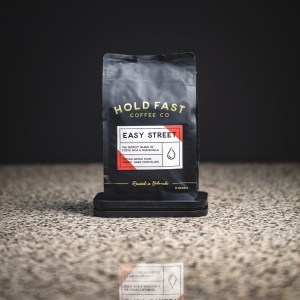As a devoted coffee drinker I was enthused by the idea of Bottomless. The Y Combinator-backed startup sends its users coffee as they run low so that they never run out of the Magic Juice of Life. What could be better?
Because life is somewhat funny, after signing up for its service the company reached out to share that it had raised a Series A. So I got on the phone with Liana Herrera, the company’s co-founder, to chat about the startup, which is part coffee-sourcing engine, part subscription/e-commerce play and part hardware effort.
So before we talk about its Series A, let’s work better to understand what Bottomless is building, and how it works.
What’s Bottomless?
Born from its founders’ issues ordering the right amount of Soylent when they actually needed it, and wondering why there wasn’t a better way to subscribe to goods consumed on a regular basis, Herrera uncovered the idea for Bottomless.
Today the product works by letting users pick the type of coffee they are interested in, be it caffeine level, price and the like. The company then provides customers with a small digital scale that they connect to their home internet. And then as users consume coffee that Bottomless sends them, placing the bag on the hardware in between uses, the scale notes how much is left and orders more before they run out.

A Bottomless scale, via the company as my kitchen lighting is bad.
You can set the sensitivity of the scale, asking it to either be ambitious in keeping you from running out of beans or ground coffee, or more relaxed. As I write to you today, I think that my third bag of decaf has arrived. It’s a neat system.
And from a business perspective, the Bottomless model has plusses. I honestly do not recall the price range of coffee that I picked, and do not know how much I am actually paying Bottomless at the moment. But I do know that having different types of coffee arrive at the house as I run low is pretty damn cool.
To make that happen, however, is not easy. The startup’s business is a little complex. Before and even after Bottomless went through Y Combinator back in 2019, the company hand-built its coffee-weighing scales. Herrera told TechCrunch that the old Silicon Valley saw that hardware is hard is in fact an understatement. After all the soldering she described during an interview, I believe her.
Still, after finishing the accelerator program the company managed to grow in 2019 by what Herrera said was around 10x. That customer expansion allowed the company to order bulk hardware from China in early 2020. After its first production run finished — a few thousand units — COVID-19 shut down that country’s supply chain. Happily for the startup, by the time COVID-19 had taken over America, the Chinese economy opened up and production could begin again.
Per the company, Bottomless scaled another 5-7x in 2020. An October 2020 CNN piece notes that the company had around 750 customers in late 2019, and some 6,000 by the time of publication. Herrera wants to massively expand that number, telling TechCrunch that she’d like to grow by 10x again this year, and that 5x expansion was the lower-end of her expectations.
Powering that growth are a host of coffee companies that Bottomless works with. Those companies handle roasting the beans and sending them to different Bottomless customers. So that no one reaches a zero-coffee state. And dies. Or whatever happens when one actually runs out of coffee.
The startup told TechCrunch that there are some 500 roasters on their wait list, implying that it will have the capacity to take on more customers this year.
Despite all the growth, the company still has some edges to refine. Setting up Wi-Fi on my scale wasn’t super-simple, for example. Herrera did note that her firm has a new scale coming out in the next three months. That could lower the difficulty barrier for new customers. Still, with 6,000 customers last October ordering three to four bags of coffee monthly, per Herrera’s estimate, the company had reached a comfortable seven-figure GMV run-rate before 2021 began.
For coffee roasters who may have seen their customer base slow during the pandemic, and consumers increasingly willing to dive into e-commerce, the company’s model could have long-term legs. Which brings us to the investors making that bet.
The round
Bottomless raised a $4.5 million Series A in January of 2021. It’s a smaller A than we tend to see in recent years, but Herrera said that her company has always been scrappy, which we take to mean that it has a history of being frugal. Patrick OShaughnessy led the round.
TechCrunch asked if the $4.5 million was a lot of money for the startup, as we didn’t have a clear picture at the time of its fundraising history. Herrera said that Bottomless has gotten to where it is today on just $2 million. So, the Series A is more than double all the money that the company as raised to date. It’s a lot of money, in other words.
Besides the new scale design, when asked about what the company intends to do with its funds, Herrera detailed the type of person she’s looking to hire — namely intellectually flexible folks who are informal, scrappy and very hack-y. More staff, in other words.
Let’s see how far Bottomless can get with its new check. Apparently I will be helping its KPIs for the foreseeable future as a customer.
Source: Tech Crunch

